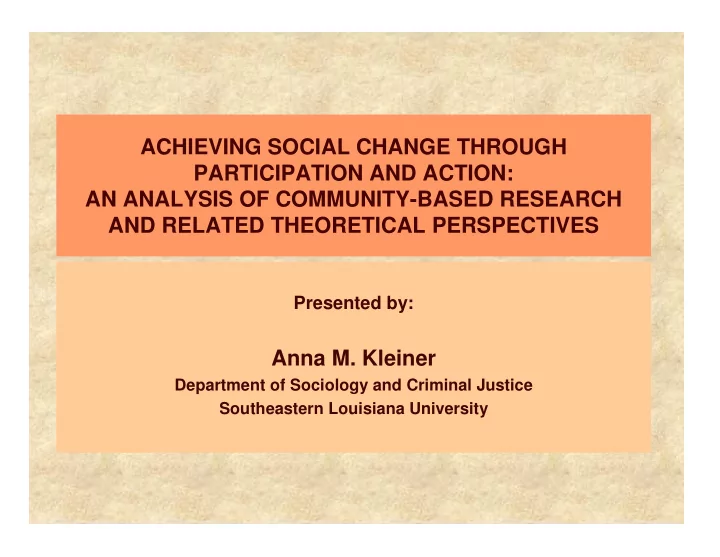

ACHIEVING SOCIAL CHANGE THROUGH PARTICIPATION AND ACTION: AN ANALYSIS OF COMMUNITY-BASED RESEARCH AND RELATED THEORETICAL PERSPECTIVES Presented by: Anna M. Kleiner Department of Sociology and Criminal Justice Southeastern Louisiana University
GLOBALIZATION AND YOUR COMMUNITY • Historically, how has social change occurred in your community? • Who usually wins? And who loses? • When research is conducted…who usually generates and uses the “knowledge”? • How do we respond to the impacts of globalization and achieve desired social change?
COMMON APPROACHES TO PARTICIPATORY RESEARCH 1. Participatory Research in Community Development (Selener 1997; SPRA 1982) 2. Action research (in organizations and education) (Dewey 1929; Selener 1997; Whyte 1989) 3. Rapid Rural Appraisal (RRA) and Rapid Participatory Appraisal (RPA) (Chambers 1994; Pretty et al 1995; Townsley 1996) 4. Participatory/Empowerment Evaluation (Coombe 1997; Dugan 1996; Fetterman 1996)
THE GOALS OF COMMUNITY-BASED RESEARCH, AS A SYNTHESIS OF APPROACHES 1. Democratize knowledge generation and use (share power of decision making and ownership of process and products) 2. Ground problem identification and solutions in everyday experience 3. Promote grassroots mobilization, self-reliance, empowerment, and emancipation (provide people with “space”) 4. Take action to change social and economic conditions, improving the lives of people
ADDRESSING COMMON RESEARCH ISSUES For Community-Based Research… • Role of the Researcher(s): co-learning; reciprocal expertise • Validity / Trustworthiness of Methods, Data, and Process • Authenticity of Participation in the Research Process
THE DELTA IN GLOBAL CONTEXT: SOME ACTION STRATEGIES 1. Focus groups, interviews and other research methods – qualitative and quantitative (e.g. asset mapping, needs assessment, surveys relating to specific issues, such as employment, health, transportation, and agriculture) 2. Policy review, development, and the policy communication network 3. Collaboration (linkages) between community organizations, government, and public and private institutions
Recommend
More recommend